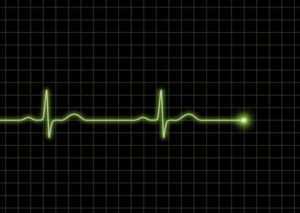![]() ELECTROCARDIOGRAM (EKG):
ELECTROCARDIOGRAM (EKG): 
An EKG is a record of the electrical activity of the heart. During this test, electrodes are placed on each arm and leg and at 6 points on the chest. If the EKG is abnormal, it may mean or suggest different types of heart problems. The EKG can provide important information about the heart rhythm, a previous heart attack, increased wall thickness of the ventricles, signs of insufficient oxygen delivery to the heart muscle or an ongoing heart attack, and problems with conduction of the electrical signals from one part of the heart to another. A normal EKG does not exclude heart disease.
![]() SIGNAL-AVERAGED ELECTROCARDIOGRAM
SIGNAL-AVERAGED ELECTROCARDIOGRAM 
This test is done in a manner similar to a standard EKG. The electrical data is acquired for a little longer time and the computer processes the information, averages it and amplifies it. The data obtained will identify any instability of the heart’s electrical system, thus providing information of the risk of potentially fatal arrhythmias.

